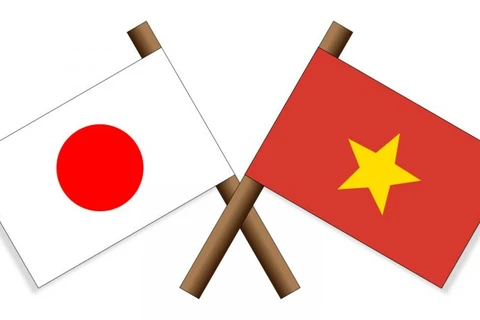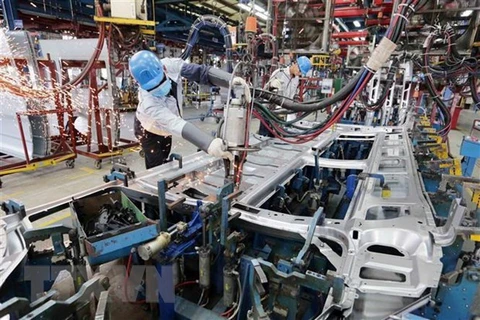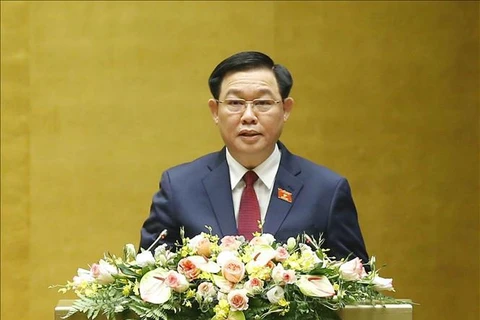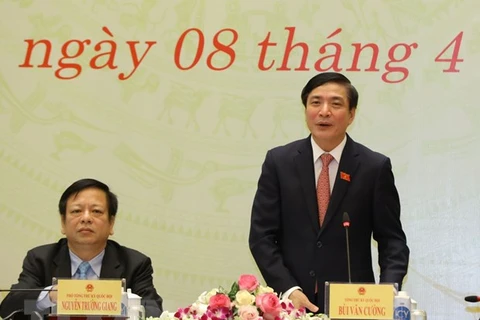Hanoi (VNA) – Vietnam’s new leadership is expected to continue inheriting and building on impressive achievements made in the past tenure to carry the country forward, contributing to ensuring peace, stability and development in the region and the world, said Dr. Takashi Hosoda, an expert on Asia-Pacific from the Czech Republic’s Charles University.
In an interview recently granted to a Vietnam News Agency correspondent in Prague, Hosoda said in order to continue ensuring national interests and security, improving the country’s stature on international arena, Vietnam needs to maintain balance between ensuring a stable regional environment and promoting economic development.
Specifically, he suggested Vietnam pay attention to joining ASEAN’s cooperation mechanisms and other multilateral cooperation frameworks with the participation of the US, Australia, Japan, the UK and the European Union to shape international code of conduct.
Additionally, Vietnam needs to keep boosting multilateral trade and mutually beneficial economic relations within the framework of multilateral free trade agreements, especially the Comprehensive and Progressive Agreement for Trans-Pacific Partnership (CPTPP) and the European Union – Vietnam Free Trade Agreement (EVFTA), he said.
In particular, Vietnam also needs to enhance trust in international relations by reinforcing bilateral and multilateral cooperative ties in a more substantial and effective manner, for the sake of peace, stability and development in the region and the world.
The scholar also expressed his special impression of Vietnam’s success in controlling COVID-19 pandemic and sustaining economic development, saying that while countries suffered negative growth due to the pandemic, Vietnam was one of a few economies to achieve a growth of 2.91 percent last year.
According to him, the success demonstrated Vietnamese leaders’ prestige, capability and determination when facing difficulties.
Hosoda also highlighted the Southeast Asian nation’s important external achievements thanks to multilateral foreign and global economic integration policies.
As ASEAN Chair in 2020, Vietnam actively worked to raise international community’s awareness about the importance of international maritime security besides other issues. Major powers like the US, Australia, India, Japan and European nations actively contributed to maintaining maritime security and freedom in Indo-Pacific and Southeast Asia in particular.
In global integration, Hosoda hailed Vietnam for actively signing important multilateral trade deals like the CPTPP and EVFTA, which held strategic significance and created a driving force for Vietnam to develop its economy.
In Russia, the Independent, the most popular newspaper in Russia, recently published an article by Chairman of the Council of Experts of the Eurasian Research Fund Grigory Trofimchuk on important leadership changes in Vietnam.
Among four new pillar leaders, Party General Secretary Nguyen Phu Trong and State President Nguyen Xuan Phuc have been known among and trusted by many Russian people.
Pham Minh Chinh is considered “the PM of the fourth industrial revolution” in Vietnam while NA Chairman Vuong Dinh Hue will assume great responsibility as inter-parliamentary cooperation is becoming an important factor of global security and stability, he wrote.
The author said Vietnam is now among 40 largest economies and 16 most successful emerging economies in the world. It also climbed three spots in the global soft power rankings.
Concluding the article, he said Vietnam’s leadership apparatus has been completed and is ready to perform harder and more ambitious tasks set by the 13th National Party Congress./.
In an interview recently granted to a Vietnam News Agency correspondent in Prague, Hosoda said in order to continue ensuring national interests and security, improving the country’s stature on international arena, Vietnam needs to maintain balance between ensuring a stable regional environment and promoting economic development.
Specifically, he suggested Vietnam pay attention to joining ASEAN’s cooperation mechanisms and other multilateral cooperation frameworks with the participation of the US, Australia, Japan, the UK and the European Union to shape international code of conduct.
Additionally, Vietnam needs to keep boosting multilateral trade and mutually beneficial economic relations within the framework of multilateral free trade agreements, especially the Comprehensive and Progressive Agreement for Trans-Pacific Partnership (CPTPP) and the European Union – Vietnam Free Trade Agreement (EVFTA), he said.
In particular, Vietnam also needs to enhance trust in international relations by reinforcing bilateral and multilateral cooperative ties in a more substantial and effective manner, for the sake of peace, stability and development in the region and the world.
The scholar also expressed his special impression of Vietnam’s success in controlling COVID-19 pandemic and sustaining economic development, saying that while countries suffered negative growth due to the pandemic, Vietnam was one of a few economies to achieve a growth of 2.91 percent last year.
According to him, the success demonstrated Vietnamese leaders’ prestige, capability and determination when facing difficulties.
Hosoda also highlighted the Southeast Asian nation’s important external achievements thanks to multilateral foreign and global economic integration policies.
As ASEAN Chair in 2020, Vietnam actively worked to raise international community’s awareness about the importance of international maritime security besides other issues. Major powers like the US, Australia, India, Japan and European nations actively contributed to maintaining maritime security and freedom in Indo-Pacific and Southeast Asia in particular.
In global integration, Hosoda hailed Vietnam for actively signing important multilateral trade deals like the CPTPP and EVFTA, which held strategic significance and created a driving force for Vietnam to develop its economy.
In Russia, the Independent, the most popular newspaper in Russia, recently published an article by Chairman of the Council of Experts of the Eurasian Research Fund Grigory Trofimchuk on important leadership changes in Vietnam.
Among four new pillar leaders, Party General Secretary Nguyen Phu Trong and State President Nguyen Xuan Phuc have been known among and trusted by many Russian people.
Pham Minh Chinh is considered “the PM of the fourth industrial revolution” in Vietnam while NA Chairman Vuong Dinh Hue will assume great responsibility as inter-parliamentary cooperation is becoming an important factor of global security and stability, he wrote.
The author said Vietnam is now among 40 largest economies and 16 most successful emerging economies in the world. It also climbed three spots in the global soft power rankings.
Concluding the article, he said Vietnam’s leadership apparatus has been completed and is ready to perform harder and more ambitious tasks set by the 13th National Party Congress./.
VNA
























